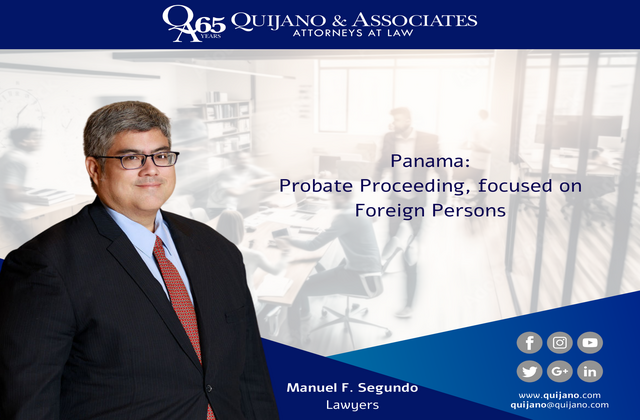Probate Proceeding in Panama, focused on Foreign Persons

The Civil Code of Panama was established in Law 2 of August 22, 1916. Civil law is the legal norm that regulates relations between the members of a community. The purpose is to preserve the interests of the subject at a moral and patrimonial level.
In this sense, in our legislation there are two types of probate proceeding, which are the following:
Intestate succession: Intestate succession is one in which there is no legal proof of the deceased to distribute his assets; or, in which there is evidence that does not meet the requirements of the law. In this case, the distribution of assets is made between the people called to inherit in accordance with what the law provides.
Testate succession: Testate succession is one in which the deceased has left evidence of his/her will by means of a testament, following the requirements of the law.
Whether testate or intestate, the probate proceeding requires the assistance of a lawyer to formalize, execute, and conclude the process with the corresponding court.
It is important to clarify that the Panamanian civil code establishes that every person is capable of being part of an inheritance, except due to legal impediment or those who the law establishes as incapable of inheriting due to unworthiness according to article 641, which is the following:
1. Parents who abandon their sons and prostitute their daughters or violate their modesty;
2. Anyone who is convicted in court for having attempted against the life of the testator, his or her spouse, descendants or ascendants;
3. Anyone who has accused the testator of a crime for which the law establishes an afflictive penalty, when the accusation is declared slanderous;
4.The heir of legal age who, aware of the violent death of the testator, had not reported it to the court within one month, when the latter had not already proceeded ex officio.
This obligation will cease in cases where, according to the law, there is no obligation to prosecute;
5. Anyone who, by threat, fraud, or violence, forces the testator to make a testament or change it;
6. Anyone who, by the same means, prevents another from making a testament, or revokes one that has been made, or supplants, hides, or alters a later one;
7. The relative of the deceased who, being insane or abandoned, does not take care of picking him up or having him picked up.
Testate probate proceeding
The Testate Probate Proceeding assumes the existence of a legal testament on the part of the deceased. The proceeding is carried out by means of a lawyer, who begins the procedures in the local Court.
Once you have met the requirements of the Testate Probate proceeding, you proceed to present the application in the Municipal Court if the assets are valued up to B./ 5,000 (USD $5,000), or in the Circuit Court if the value of the assets is older
The basic requirements to begin the testate probate proceeding are:
- Power of attorney and request of the lawyer.
- Original of the death certificate
- Copy of testament
- Identification of the people mentioned in the testament.
- List of real estate or personal property to be distributed.
- Appraisal of real estate and personal property to be distributed.
It should be noted that in this case it is not necessary that they be direct relatives; in this case, it is enough for the heirs to be appointed by a testator, for them to benefit from the inheritance in question.
Once the documents are received at the court, the probate hearing is opened where the Judge declares the people designated in the testament as heirs.
In this hearing, the judge shall issue a declaration of heir that must be published in a national newspaper for three days, after which the assets shall be awarded.
It is estimated that the Testate probate proceeding may last from 4 to 8 months when all heirs agree and all documentation is in order.
Intestate Probate Proceeding
Intestate proceeding is also carried out by means of a lawyer, who initiates the proceeding in the local Court.
Once you have met the requirements of the Intestate Probate Proceeding, you proceed to present the application in the Municipal Court if the assets are valued up to B./ 5,000 (USD $5,000), or in the Circuit Court if the value of the assets is grater
In this case, the basic requirements to begin the Probate Proceeding are:
- Power of attorney and request of the lawyer.
- Death certificate.
- Obtain non-testament certification from all Panamanian notaries.
- Birth certificate of the children, if any.
- Marriage certificate, if applicable.
- Certificate that demonstrates the family link with the “De Cuyus”
- List of movable or immovable property to be inherited.
- Appraisal of real estate and personal property to be inherited.
It should be mentioned that the appraisal of assets must be meticulous, determining the market value not only of assets existing in the Public Registry (such as real estate or automobiles), but also considering assets such as works of art, shares in the stock market or in private companies.
Once the competent authority evaluates and receives the documentation provided, the probate begins. After evaluating the documentation, a process that can take several weeks, the judge proceeds to declare heirs to those who have proven their link with the deceased and once the procedural stages have been completed, the inheritance assets are awarded.
It is estimated that the Intestate probate proceeding may last 4 to 8 months when all parties agree and all documentation is in order.
What happens when the person is a foreigner.
Here we have to establish under 2 premises
- If this person resided in Panama, at the time of death
- If he had assets titled in our country at the time of his death
In this sense, the Code of International Private Law defines the following:
Article 51.The free will to make a testament and the legal regime for the protection of assets constituted by residents or foreigners are of public order.
The freedom of making a testament of residents or foreigners with assets in the Republic of Panama, as well as the asset protection instruments created by the testator, will be subject to Panamanian law.
Article. 52.Inheritance in general as a universal process of transmission of ownership is governed by the law of the situation of the assets, even if the deceased, at the time of his death, was domiciled abroad.
The judgment on the allocation of assets issued in a foreign country in accordance with the laws of that country shall have legal force in the Republic of Panama, unless it conflicts with rights founded on Panamanian law, which are enforced before national courts. ~o~
The competent court to hear the universal probate proceeding is that of the place where the assets of the deceased are located.
Article 53.Testaments, as to their form, are governed by the law of the place where they were issued.
Article 54.Panamanians may make a testament outside the national territory, subject to the forms established by the laws of the country in which they are located.
They may also make a testament on the high seas, while sailing on a foreign vessel, subject to the laws of the country of registration of the vessel.
Likewise, they may make a holographic testament, even in countries whose laws do not allow such a testament. For this testament to be valid, it must be made by persons of legal age, be written in the testator’s handwriting, and signed by him, stating the year, month, and day on which it is granted.
Article 55. A joint testament executed in a foreign country shall not be valid in the Republic of Panama, even if it is authorized by the laws of the nation where it was executed. Two or more people may not make a testament jointly or in the same instrument, even if they do so for reciprocal benefit or for the benefit of a third party.
Article. 56. An open or closed testament may be executed in a foreign country before the diplomatic or consular agent of the Republic of Panama residing in the place of execution.
In this case, said agent shall act as a notary, and the condition of domicile for witnesses is not necessary.
Article 57. The diplomatic or consular agent will send, by means of the Ministry of Foreign Affairs, authorized with his signature and seal, a copy of the open testament or the document granting the closed testament to the Secretary of Government so that he can deposit it in his file.
Article 58. The diplomatic or consular agent in whose possession a holographic or closed testament has been deposited shall send it through the corresponding channel to the General Secretariat of the Ministry of Government when the testator dies, with the death certificate.
The General Secretariat of the Ministry of Government will publish the news of the death in the official newspaper so that those interested in the inheritance may collect the testament and manage its formalization in a preventive manner.
Article 59. The testament granted by foreigners outside the national territory shall be valid in the Republic of Panama subject to the rules established by the laws of the country in which it is granted.
Likewise, the holographic testament executed shall be valid even in countries whose laws do not admit these provisions.
In these cases, the testaments that have been made in the Republic of Panama, by foreigners are valid, and may be subject to being presented before the ordinary courts of justice of Panama.
On the other hand, according to our legislation, succession in general as a domain process must be governed by the Law of the situation of assets, even if the deceased, at the time of his death, was residing outside of Panama.
It is important to define that foreign judgments of a declaratory nature on the allocation of inheritance assets of foreign persons can be recognized in Panama and they shall have legal force unless the fundamental principles of Panamanian law conflict. This means that any adjudication order is effective as long as it does not violate principles of Panamanian international public order.
This is attended to in the first instance in the Fourth General Business Chamber of the Supreme Court of Justice, and lasts an average of 4 to 8 months, through the process RECOGNIZATION AND APPROVAL OF FOREIGN JUDGMENT, which has its requirements in the Judicial Code that establishes the following:
Article 1419. Judgments pronounced by foreign courts and foreign arbitration rulings shall have in the Republic of Panama the force established by the respective agreements or treaties.
If there are no special treaties with the State in which the sentence was pronounced, it may be executed in Panama, unless there is proof that said State does not comply with those issued by the Panamanian Courts.
If the judgement comes from a State in which those issued by the Panamanian Courts are not complied with, it shall not have force in Panama.
Without prejudice to what is provided in special treaties, no judgement issued in a foreign country may be executed in Panama if it does not meet the following requirements:
1. That the judgement has been issued as a result of the exercise of a personal claim, except as the Law provides especially in matters of successions opened in foreign countries;
2. That it has not been issued in default, meaning, for the purposes of this article, the case in which the claim has not been personally notified to the defendant, having ordered personal notification by the Court of the case, unless the defaulting defendant requests execution;
3. That the obligation whose fulfillment has been carried out is lawful in Panama; and
4. That the copy of the judgement is authentic.
A judgement is understood to be the decision that decides the claim.
Article 1420. The request to declare whether or not a foreign Court judgement should be complied with shall be presented to the Supreme Court of Justice, unless, in accordance with the respective treaties, another Court must hear the matter. The Court shall inform the party that must comply with the judgement and the Attorney General of the Nation for a period of five days each and if everyone agrees that it should be executed, it shall decree so.
If the parties are not in agreement and there are facts to prove, the Court shall grant a period of three days to adduce evidence and fifteen days to take it, without prejudice to granting an extraordinary period to take evidence abroad. Once this expires, he shall hear the parties, successively giving each one a period of three days, after which he shall decide whether or not the judgement should be executed.
If the Court declares that the judgement must be executed, its execution shall be requested before the competent Court.
The authenticity and effectiveness of judgements issued in a foreign country are established in accordance with article 877.
This being so, we must see what options the particular case is under to be able to see what is the best way, to be able to appropriately complete the transmission of the inheritance assets to their heirs.
Do not hesitate to contact our team of experts to obtain more information about the types of probate proceeding in Panama in the situation in question.




